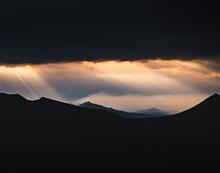Betwixt and Between
Without warning, somebody turned off the lights. Analogous to Genesis’ primordial darkness, the world seems to exist these days in a chaotic void that is entirely absent from God’s creative voice.
For more than two years, we have inhabited a space that feels like nothingness—thick dark and formless matter awaiting to be shaped and given purpose by divine light. Meanwhile, night and day have yet to find separation, fundamentally affecting our awareness of God in time.
I simply do not have the privilege to await a time when heaven finally draws up the courage to kiss earth on the lips.
The pandemic has deeply challenged my preconceived notions about how and where God dwells in my life. I couldn’t quite tell you where I picked up the notion that divine goodness is discoverable in structure, in our orderly arrangements of the social world, but that idea is now completely obsolete.
Overload of Everything
Even on my best days, I feel out of sync and out of step, never fully present, always seemingly behind. Now more than ever, the overload of information and news keeps our societies as up to date and anxious as possible. And yet, our lives—my life—has been so fragmented by unresolved trauma and aggregated grief that the world in which I live is presently fixed in the past.
Indeed, time and space function differently in the darkness. Like Salvador Dali’s famous Melting Clocks, the past and present have become wholly undistinguishable. Like a polaroid picture stuck between development and blankness, between memory and forgetfulness, I frequently find myself in a state of incoherence. Perhaps this is what happens when the present era is so preoccupied with—so dominated and possessed by—the dead and the dying that we live in a perpetual past, never really experiencing the forward progress and continuity of life.
Who is God, we like to say, if not the creator of perfect categories and chronological order? Who are we if not constantly striving for a certain purity, faultlessness, and precision in our knowledge of God, ourselves, and the world? Certainly, my mind likes to believe that God created the world in a succinct and well-organized seven days. Yet how it is possible to think of God this way without us ordering and hierarchizing people? Our image of God gives us justification to structure and legitimize lethal hierarchies, codes, systems.
Existential Exile
Public health disparities, racial segregation, a lack of access to quality education, food, and housing—these are structural. Neighborhoods with a higher black and brown demographic suffer the highest mortality rates from Covid. Do not confuse this with serendipity. So many people have died that our graveyards, adorned with store-bought florals, have slowly transformed into gardens. This is not kismet. Black death and dying is structural. What I’ve learned as a student of the religious and socio-cultural experiences of black women is that life and death intermingle. They are in many ways inseparable, as dictated by a pitiless contemporary order. Our existential exile ensures that our lives are disjointed, out of sync, and forever teetering on the edge of mortality. Will we never live a day that is not also night? In this sense, structure is a form of captivity, comparable to violence, trauma, and terror. Thus, it is immensely difficult for me to cast my hope in a God who prioritizes order over the messiness of human life—of my life.
Is order necessary to know God with clarity? An even better question would be: why do we need to know God with clarity at all? Throughout my life, I have spent so much time attempting to discern, get quiet, and listen for a very specific voice to speak in a very limited way. I was the one joining those 6 a.m. prayer calls endeavoring to hear and know God anew. Yet I was not truly willing to sit in the discomfort and uncertainty that faith requires.
Akin to the many black women who have gone before me, I too have been like Hagar, desperately needing to name God for my own survival. In the face of life circumstances, race-gender disparities, and death’s overwhelming presence, my God knowledge has never experienced stability or tranquility. My deep need to know and thus control has left me nothing but a brittle theological imagination always threatening to break if stretched too thin.
A Threshold of Promise
What would it mean for our religious spaces if we were to look beyond customary expectations about the divine? As a black woman who also happens to study eschatology, I must admit that I do not await the future-resurrecting second-coming power of eternal life. Since death and injustice are a present reality, I simply do not have the privilege to await a time when heaven finally draws up the courage to kiss earth on the lips. Inadvertently raised by the theological minds of James Cone and Delores Williams, and decisively by faculty members at Yale Divinity School, I do not conceptualize the heavenly future as a vision in which humanity should place their hope. Neither do I trust a transcendentally future-tensed God who determines such scenarios. This divine being is too busy trying to turn darkness into light, boundedness into freedom, right now.
Here, in between, the present is also the past, the threat of death is a principal condition confronting the living, and what I know about God is mutable, embodied, and constantly needing imagination. I choose to believe in God whose presence moves with me in temporal, spiritual, and existential ambiguity. I surmise that this grey area is also a threshold ripe with radical possibility. If we embrace this condition, maybe we can adopt the very nature of our creator and forge new worlds that conjure a future for the here, the there, and the in-between.
After graduation in May, Amina Shumake ’21 M.Div., ’22 S.T.M. will enter a Ph.D. program in theology at Vanderbilt University this fall.

